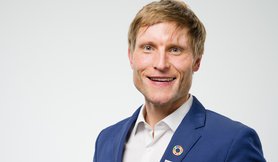Prof. Dr. rer. pol. Christoph Scope
Chair of Business Administration / Sustainability Management
Prof Dr Christoph Scope studied economics (Diploma) specialising in energy economics and corporate environmental management at TU Dresden after completing his Bachelor's degree in European Economic Studies at Otto-Friedrich University Bamberg. At Siemens AG in Munich, he worked in the Corporate Environmental Management department on the real integration and conception of its sustainability management. This included the design and analysis of environmental performance indicators for annual/sustainability reports or sustainability rankings as well as the ongoing development of its sustainability strategy. In his doctorate at the TU Dresden, he focussed on operational, life cycle-based decision-making tools for sustainability management in the application fields of electromobility, sustainable building materials and desalination technologies. He has spent time abroad in Poland, the USA and France.
His research focuses on the design, utilisation and integration of life cycle-based decision-making tools and key control variables of sustainability management accounting, e.g. life cycle assessment or life cycle costing, in management systems and external reporting. He also is interested in the sustainable transformation of sports clubs. He addresses these topics in his teaching.
Prof. Dr. rer. pol. Christoph Scope
- Z 713
- +49 351 462 2535
Portrait: © HTW Dresden / Peter Sebb
Response times:
Monday: 11-12.45 am
Friday: 9-12.00 am
upon inquiry (please request by e-mail)

General topic suggestions for a thesis
Below you will find a list of possible topics for a thesis. The listed topics are intended as examples and can also be used to develop your own research question. If you have your own ideas, we can openly discuss them. Please contact Prof. Dr. Christoph Scope directly.
Sustainability reporting: Impact of regulatory requirements, such as CSRD (Omnibus) or recommendations, such as the “Deutsche Nachhaltigkeitskodex” (DNK), on practice in manufacturing companies and the banking sector. Why should companies engage in a form of non-financial reporting?
Sustainability management: Impact of the DFL sustainability guideline on the sustainability activities of clubs in German professional football leagues, esp. the German 1st and 2nd Bundesliga, Third division. Why should football clubs concern themselves with sustainability management?
Sustainability assessment: How can sustainability assessments, such as carbon footprints and life cycle assessments, be carried out appropriately, integrated into controlling and used effectively by management for decisions regarding new products or business models?
Winter semester 2025/26
- Compulsory module in the study programme W72 - Business Administration and Engineering
in the 3. semester
- Compulsory module in the study programme W79 - German Business Culture and International Management
in the 1. semester - Compulsory elective module in the study programme W72 - Business Administration and Engineering
in the 2. semester
- Compulsory elective module in the study programme W72 - Business Administration and Engineering
in the 2. semester
- Compulsory elective module in the study programme W76 - Management of small and mid-sized companies/family firms
in the 2. semester - Compulsory elective module in the study programme W72 - Business Administration and Engineering
in the 2. semester
- Compulsory elective module in the study programme W72 - Business Administration and Engineering
in the 2. semester - Compulsory elective module in the study programme W76 - Management of small and mid-sized companies/family firms
in the 2. semester
- Compulsory module in the study programme E121 - Electrical Engineering and Information Technology
in the 7. semester
- Compulsory module in the study programme E124 - Electrical Engineering / Elektrotechnik
in the 7. semester
- Compulsory module in the study programme G61 - Surveying
Unit "Betriebswirtschaftslehre (1)" in the 7. semester
Summer semester 2026
- Compulsory module in the study programme G60 - Geomatics - Surveying/Cartography/Geoinformatics
in the 6. semester
- Compulsory module in the study programme W72 - Business Administration and Engineering
in the 6. semester
- Compulsory module in the study programme W74 - International Business
in the 2. semester - Compulsory module in the study programme W71 - Business Administration
in the 2. semester
- Compulsory elective module in the study programme W75 - International Management
in the 1. semester - Compulsory elective module in the study programme W76 - Management of small and mid-sized companies/family firms
in the 1. semester - Compulsory elective module in the study programme W72 - Business Administration and Engineering
in the 1. semester
- Compulsory elective module in the study programme W76 - Management of small and mid-sized companies/family firms
in the 1. semester - Compulsory elective module in the study programme W72 - Business Administration and Engineering
in the 1. semester
- Compulsory module in the study programme W71 - Business Administration
in the 4. semester
- Compulsory module in the study programme L39 - Chemical Engineering
in the 6. semester
- Compulsory module in the study programme I46 - Applied Informatics
Unit "Unternehmensführung" in the 2. semester in the field of study "Informations- und Kommunikationstechnologien" - Compulsory module in the study programme I46 - Applied Informatics
Unit "Unternehmensführung" in the 2. semester in the field of study "Medieninformatik" - Compulsory module in the study programme I47 - Applied Informatics
Unit "Unternehmensführung" in the 1. semester in the field of study "Medieninformatik" - Compulsory module in the study programme I47 - Applied Informatics
Unit "Unternehmensführung" in the 3. semester in the field of study "Informations- und Kommunikationstechnologien"
- Compulsory module in the study programme E20 - Electrical Engineering/Communication Technology
Unit "Betriebswirtschaft / FS" in the 6. semester in the field of study "Nachrichtentechnik" - Compulsory module in the study programme E20 - Electrical Engineering/Communication Technology
Unit "Betriebswirtschaft / FS" in the 6. semester in the field of study "Automatisierungstechnik"
- Compulsory module in the study programme G61 - Surveying
Unit "Betriebswirtschaftslehre (2)" in the 8. semester

